US intercepts Iran weapons cache as second ship hit near Yemen
A bulk carrier rushed to port after the second missile strike on ships in the Red Sea in two days, as the US released images of seized Iranian weapons sent to Houthi rebels.
World
Don't miss out on the headlines from World. Followed categories will be added to My News.
The US military released images of Iranian-made missile parts it seized en route to Houthi rebels from a boat in the Arabian Sea in the first such operation since the start of Houthi attacks against commercial ships last year.
It comes as a Greek-owned cargo ship was hit by a missile off Yemen the day after a US-owned ship was struck in a similar attack.
The US Central Command said it intercepted weapons bound for Yemen in a mission off the coast of Somalia that left two Navy SEALS missing at sea
“This is the first seizure of lethal, Iranian-supplied advanced conventional weapons (ACW) to the Houthis since the beginning of Houthi attacks against merchant ships in November 2023,” CENTCOM said.
USCENTCOM Seizes Iranian Advanced Conventional Weapons Bound for Houthis
— U.S. Central Command (@CENTCOM) January 16, 2024
On 11 January 2024, while conducting a flag verification, U.S. CENTCOM Navy forces conducted a night-time seizure of a dhow conducting illegal transport of advanced lethal aid from Iran to resupply Houthi… pic.twitter.com/yg4PuTZBh7
“Seized items include propulsion, guidance, and warheads for Houthi medium-range ballistic missiles (MRBMs) and anti-ship cruise missiles (ASCMs), as well as air defence associated components,” it added.
“Initial analysis indicates these same weapons have been employed by the Houthis to threaten and attack innocent mariners on international merchant ships transiting in the Red Sea,” it said.
US Central Command chief Michael Kurilla said an “exhaustive search” was underway for two Americans who went missing during last week’s operation.
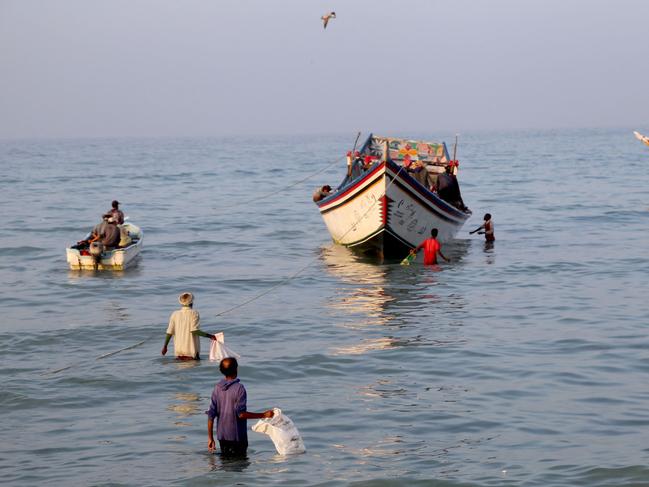
The Navy SEALS boarded a traditional masted sailing vessel with 14 crew members on board. The boat was scuttled and the crew’s “disposition was being determined in accordance with international law.”
“It is clear that Iran continues shipment of advanced lethal aid to the Houthis. This is yet another example of how Iran actively sows instability throughout the region,” Kurilla said, adding that Tehran’s actions violated both a UN security resolution and international law.
FOLLOW BELOW FOR UPDATES
SECOND SHIP IN TWO DAYS HIT NEAR YEMEN
A Greek-owned cargo ship was hit by a missile off Yemen a day after a US-owned ship was struck in the Red Sea.
Maritime risk management company Ambrey said the Malta-flagged, Greek-owned bulk carrier was transiting northbound when it was hit by a missile.
The ship, which has visited Israel since the outbreak of war in Gaza and was headed to Suez, changed course and headed to port after the incident, Ambrey said.
There was no immediate comment from the Huthis, who launched attacks on American vessels on Sunday and Monday following US and UK strikes on their territory last week.
United Kingdom Maritime Trade Operations, a maritime security agency run by the British Navy, also reported an “incident” in an area northwest of Saleef in Yemen, without giving further details.
US-OWNED SHIP HIT IN RED SEA
Yemen’s Iran-backed rebels have claimed an attack against an American-owned ship in the Gulf of Aden, after the United States military reported a rebel missile struck the cargo vessel.
The Huthis “carried out a military operation targeting an American ship” on Monday (Tuesday AEFT), the Huthis’ military spokesman Yahya Saree said, adding “a certain number of appropriate naval missiles” were used.
It came after the US military said forces shot down a cruise missile fired at an American destroyer warship from Houthi controlled areas of Yemen, the latest clash over attacks on shipping in the Red Sea.
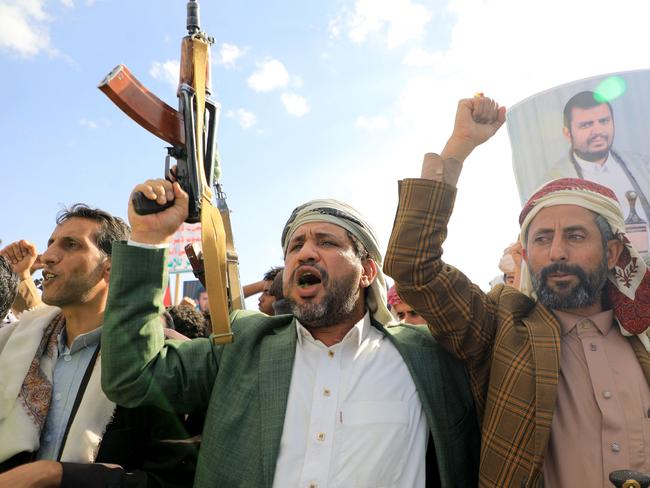
“On January 14 at approximately 4:45 p.m. (Sanaa time) an anti-ship cruise missile fired from Iranian-backed Houthi militant areas of Yemen toward USS Laboon (DDG 58), which was operating in the Southern Red Sea,” the United States Central Command said in a statement.
US fighter aircraft shot down the missile and there were no injuries or damage reported, according to CENTCOM
The US-led coalition carried out strikes against the Iranian-backed rebel group in Yemen and warned more strikes were possible if the Houthi attacks continue.
US UNLEASHES NEW WAVE OF YEMEN AIR STRIKES
US forces have unleashed a second wave of air strikes against Houthi rebels in Yemen, just hours after a White House spokesperson denied the first wave was intended to ignite a war.
The new strikes targeted a radar facility one day after combined American and British forces unleashed a bombardment in retaliation for attacks on merchant ships in the Red Sea.
Yemen’s Iran-backed Houthis warned US and British interests are now “legitimate targets” and vowed to continue attacking commercial ships transporting Israeli goods.
The barrage of strikes against the Houthis, who claim they are acting in solidarity with Gaza, stoked fears of the Israel-Hamas conflict spreading across the region.
Violence involving Iran-aligned groups in Yemen, Lebanon, Iraq and Syria has surged since the war in Gaza began in early October.
Britain, the United States and eight allies – including Australia – said the strikes aimed to “de-escalate tensions”.
But Iran and other governments condemned the Western action and warned that unrest could worsen.
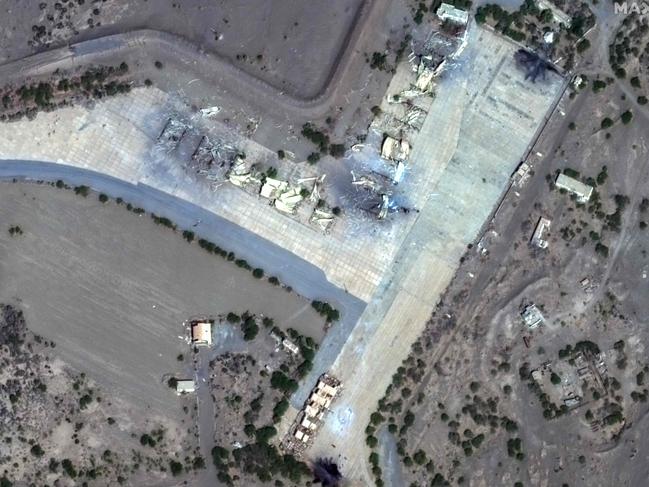
The UN Security Council is due to hold an emergency meeting on the strikes, days after adopting a resolution demanding the Houthis immediately stop their attacks on ships.
Oil prices rose four per cent on fears of an escalation before falling back. The Houthis have intensified attacks on what they deem Israeli-linked shipping in the Red Sea – through which 12 per cent of global maritime trade normally passes – since Hamas’s unprecedented attack on Israel triggered the Gaza war on October 7.
The rebels have controlled much of Yemen since a civil war erupted in 2014 and are part of an Iran-backed “axis of resistance” against Israel and its allies.
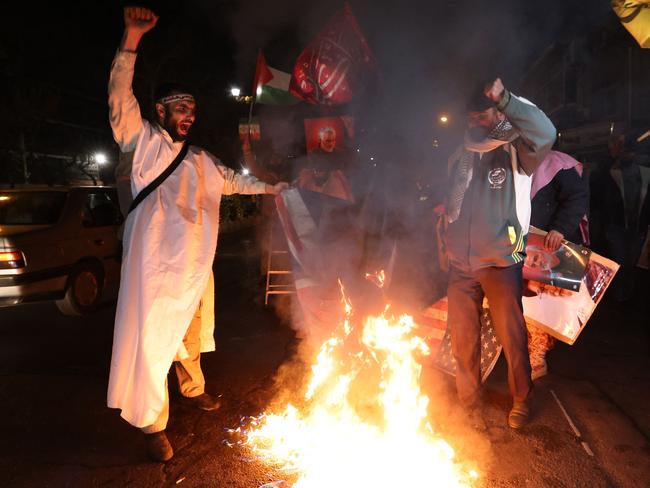
“All American-British interests have become legitimate targets” for the Houthis following the strikes, the rebels’ Supreme Political Council said.
Hussein al-Ezzi, the rebels’ deputy foreign minister, said the United States and Britain must “prepare to pay a heavy price”.
The Houthis fired “at least one” anti-ship ballistic missile in retaliation that caused no damage, according to US General Douglas Sims.
US President Joe Biden called the strikes a successful “defensive action” after the “unprecedented” Red Sea attacks, and said he would act again if the Houthis continued their “outrageous behaviour”.
British Prime Minister Rishi Sunak said the Houthis’ breach of international law warranted the “strong signal”, with his government publishing its legal position justifying the strikes as lawful and “proportionate”.
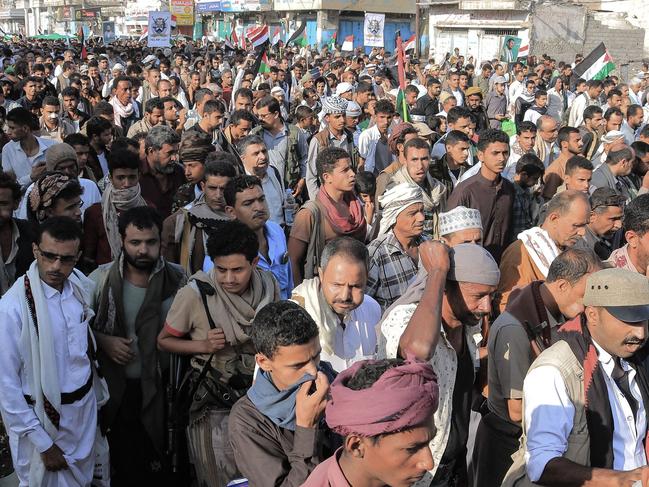
Nasser Kanani, spokesman for Iran’s foreign ministry, said the Western strikes will fuel “insecurity and instability in the region” while “diverting” attention from Gaza.
Hamas said it will hold Britain and the United States “responsible for the repercussions on regional security”.
But the White House said the United States did not seek conflict with Iran, with National Security Council spokesman John Kirby telling MSNBC there was “no reason” for an escalation.
Hundreds of thousands of people, some carrying Kalashnikov assault rifles, gathered in Yemen’s capital Sanaa in protest, many waving Yemeni and Palestinian flags and holding portraits of Houthi leader Abdulmalik al-Houthi.
‘BLOODBATH’
The US and UK’s closest ally in the Middle East warned the Red Sea would become a “bloodbath” after strikes against Houthi rebels in Yemen, which were supported by Australian forces in the region.
NATO member Turkey, already at odds with the West over its support of Israel against Hamas, described the strikes as “disproportionate” after reports at least five people were killed and another six wounded.
“It is as if they aspire to turn the Red Sea into a bloodbath,” said Turkish President Recep Tayyip Erdogan.
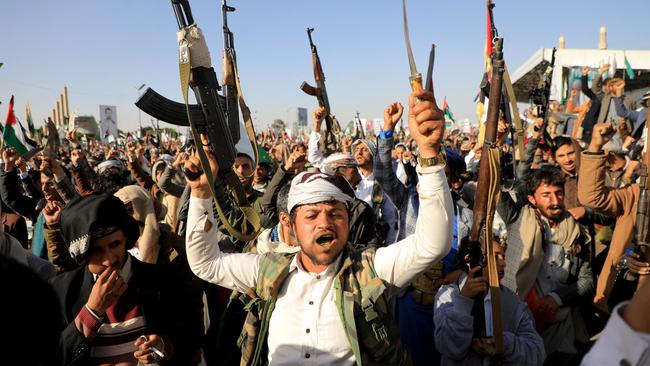
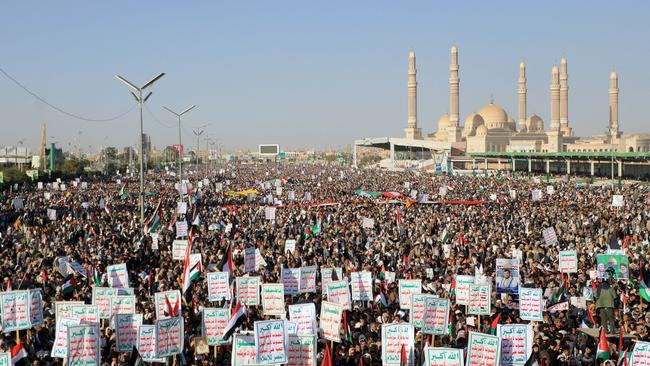
United Kingdom Prime Minister Rishi Sunak said the strikes were intended to send “a strong signal” that the Houthis couldn’t attack civilian ships in the region “with impunity”.
“We won’t hesitate to protect lives and ensure the safety of commercial shipping,” Sunak said during a visit to Ukraine.
The Iran-backed rebels responded that US and British interests were now “legitimate targets” and threatened that the strikes would not go “unanswered”.
“The Americans and the British should not believe that they will escape the punishment of our heroic armed forces,” the Houthis'’ Supreme Political Council said in a statement.
“All American-British interests have become legitimate targets for the Yemeni armed forces in response to their direct and declared aggression against the Republic of Yemen.”
It was unclear if the Houthis intended to target ships from countries that provided non-operational support to the attacks, including Australia, Canada, the Netherlands and Bahrain.
The Australian Defence Force supported the operation from Bahrain, where logistic personnel have been based since last year to assist in operations protecting Red Sea trade routes.
The coalition forces struck over 60 targets with more than 100 precision-guided munitions at 16 Iranian-backed Houthi militant locations, according to US Air Forces Central Commander Lt. Gen. Alex Grynkewich.
Targets included Houthi command and control nodes, munitions, depots, launching systems, production facilities, and air defence radar systems, he added.
Massive protests broke out in the streets of Yemen the morning after the strikes.
NEW - Large protest in Yemen after US/UK airstrikes. pic.twitter.com/KQTPaLFNAy
— Disclose.tv (@disclosetv) January 12, 2024
The White House insisted it was “not looking for a conflict with Iran” after Tehran wailed that the strikes against Yemen were a “violation” of international law.
“We’re not looking to escalate and there’s no reason for it to escalate beyond what happened over the last few days,” National Security Council spokesman John Kirby told MSNBC.
Iran’s foreign ministry spokesman Nasser Kanani earlier warned the attacks “will have no result other than fuelling insecurity and instability in the region”, and urged the international community to take action “to prevent the spread of war”.
The United Nations Security Council was set to hold an emergency meeting over the growing crisis.
AUSTRALIA REVEALS ROLE IN YEMEN STRIKES
US and British forces with Australian military support have launched missile air strikes against more than a dozen targets used by the Iranian-backed Houthis in Yemen, in a significant escalation of the crisis in the Middle East.
Warship and submarine-launched Tomahawk cruise missiles and RAF fighter jets hit an airfield, coastal radar and air defence systems, weapons storage and logistic militia bases near five cities including Yemeni capital Sana’a.
Footage showed significant explosions that immediately attracted condemnation by the Houthis who described the calculated strike as “brutal aggression” that would see a greater retaliation.
US President Joe Biden said the assault was carried out by US and UK forces with non-operational “support” from Australia, Bahrain, Canada and the Netherlands.
It is understood Australia’s non-operational support involved Australian Defence Force logistic personnel based in Bahrain, specifically deployed there last year to assist with the operation by allies to protect Red Sea trade routes.
The strikes followed repeated warnings from the West against the Houthis which had been carrying out assaults on cargo ships passing through the Red Sea using Iranian-supplied ballistic missiles and armed drones.
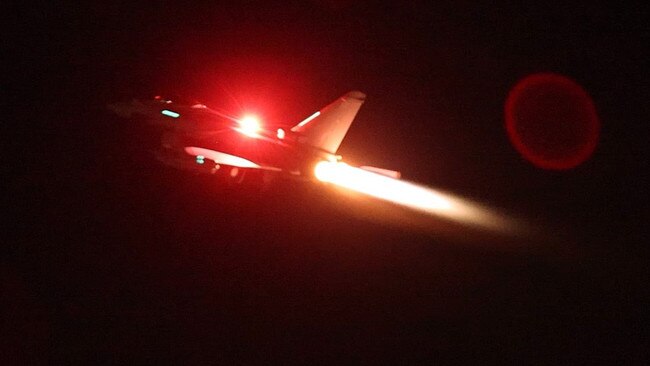
The Houthis had been launching attacks in response to the Israeli assault on Hamas and Gaza and initially vowed to just target Israel-linked shipping but extended attacks to all international vessels passing through the Red Sea.
The White House issued a joint statement with 10 allies including Australia and said Iran had been involved “in every phase” of the Houthi attacks and the strikes were self defence.
Defence Minister Richard Marles said it was important Australia stood firm in upholding the laws of the seas and the decision to conduct the strike was “not taken lightly”.
He said it was in Australia’s national interest.
“Australia will continue to support any actions which assert the global rules based order, which assert the UN convention of the laws of the sea and which assert freedom on navigation on the high seas be that in the Red Sea, be that in the Indo Pacific be that in other parts of the world,” he said during a hastily arranged door stop.
He added Australia had to stand up and firmly for the rules based order particularly as an island trading nation.
.@SecDef: "Today the militaries of the United States and the United Kingdom, with support from Australia, Bahrain, Canada, and the Netherlands, conducted strikes against military targets in Houthi-controlled areas of Yemen." Full Statement: https://t.co/r8U74pKRzC
— Maj. Gen. Patrick Ryder (@PentagonPresSec) January 12, 2024
Mr Marles declined to go into the extent of Australia’s support nor when the US-UK advised it would carry out an assault but confirmed the ADF’s input was in the operational headquarters for the activity.
He would not say whether Australia would now commit a warship to the Red Sea as requested earlier by the US to be part of an allied effort to protect the trade route.
The strikes, which involved British RAF Typhoons, were said to have had a significant effect on Houthi military capabilities but would most likely not stop their attempt to launch further attacks.
British Prime Minister Rushi Sunak had earlier held an emergency full Cabinet meeting late in the evening to discuss how he planned to respond to the continued Houthi disruption to world trade.
Highlighting the significance of the assault, he also briefed Opposition leader Sir Keir Starmer, shadow defence secretary John Healey and called in Commons Speaker Sir Lindsay Hoyle to the Cabinet office.
He said the actions of the Houthis in their series of “dangerous and destabilising attacks” against commercial shipping in the Red Sea threatened UK and other international ships and had caused trade routes and driven up commodity prices notably oil.
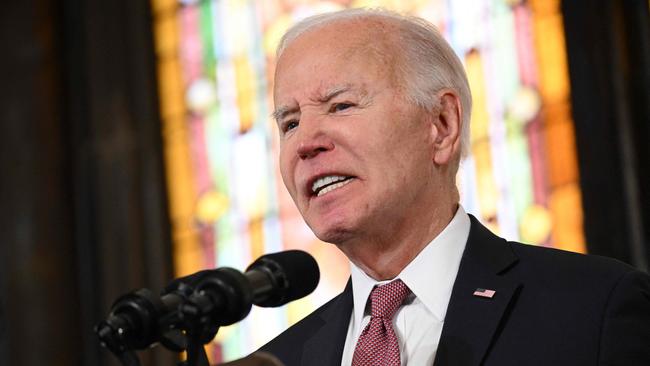
“Despite the repeated warnings from the international community, the Houthis have continued to carry out attacks in the Red Sea, including against UK and US warships just this week,” he said in a statement. This cannot stand. The United Kingdom will always stand up for freedom of navigation and the free flow of trade.”
He said the “limited, necessary and proportionate action in self-defence” with the US was against targets tied to the Houthis; he had earlier had a conversation also with the Egyptian president Abdel Fattah El-Sisi.
US President Joe Biden held similar high-level talks with his senior figures and vowed that more strikes on the Houthis would follow if they persisted.
“These strikes are in direct response to unprecedented Houthi attacks against international maritime vessels in the Red Sea – including the use of anti-ship ballistic missiles for the first time in history,” the president said.
“More than 50 nations have been affected in 27 attacks on international commercial shipping. Crews from more than 20 countries have been threatened or taken hostage in acts of piracy. More than 2,000 ships have been forced to divert thousands of miles to avoid the Red Sea.”
He described the strikes as a “defensive action” following extensive diplomacy to avoid trouble.
“These targeted strikes are a clear message that the United States and our partners will not tolerate attacks on our personnel or allow hostile actors to imperil freedom of navigation in one of the world’s most critical commercial routes,” he said.
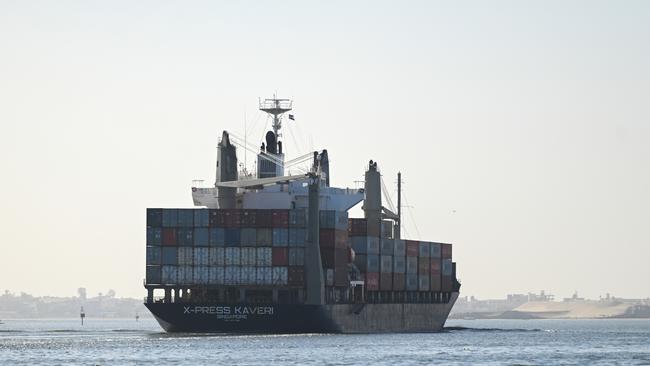
The US Central Command said the Houthis had been launching a “complex attack” including this week with a total of 18 attack drones, two anti-ship cruise missiles and an anti-ship ballistic missile which had to be shot down.
It said the attack was the 27th Houthi attack on the Red Sea shipping lanes since November 19.
The Houthis are a Shia militant group, allied to Tehran, as are Hamas and Hezbollah, and seeks to reduce western influence in the Middle East.
The group emerged in the 1990s and its supporters mainly come from the ranks of Zaidi Shia Muslims and the Houthi tribe.
With AFP




